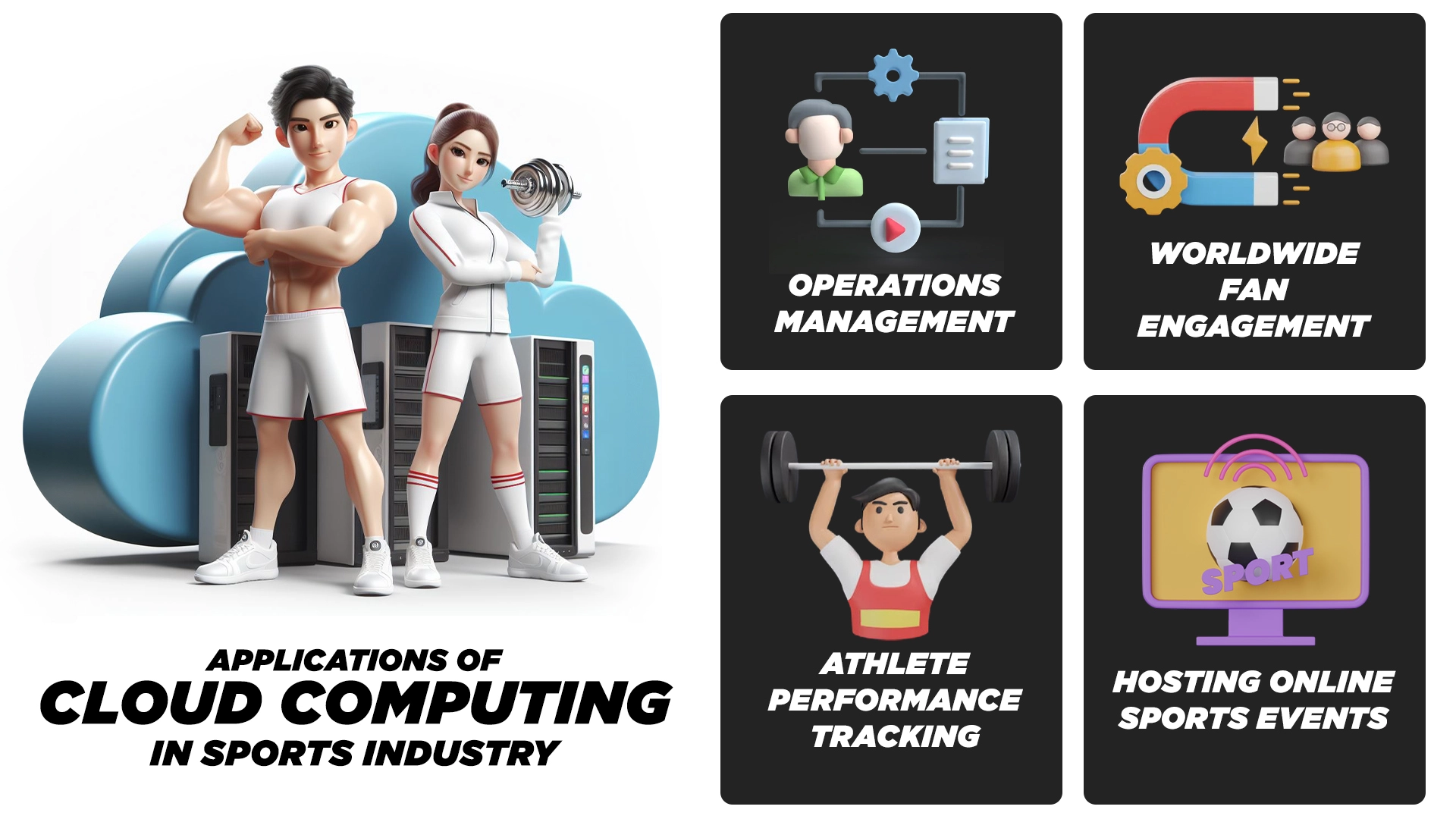In the last two decades, the dominance of cloud computing has been visible across industries and consumers. We have reached the point where nearly everything, from music, video, and games to personal files, is residing on the cloud. And all we have to do is tap a few buttons and access our files from anywhere. The flexibility, scalability, and cost-effectiveness of cloud computing are what make it highly demanding.
Talking about the sports industry, cloud computing has raised the potential of the industry transforming it in diverse aspects. We will talk about these aspects in detail to understand how cloud computing is powering the sports industry.
Table of Contents
Overview Of Cloud Computing In Sports Industry
In recent years, cloud computing has unlocked new dimensions for the sports industry. It has unlocked an effective solution for data storage and analytics for the industry. Not only for industries, cloud has unlocked new ways of booking tickets, social media interaction, broadcasting matches, and more.
Considering the players, cloud computing has unlocked the role of AI in sports app development and delivered better athlete performance tracking. Wearable devices integrate with cloud technology to deliver the required data analysis to coaches and athletes, promoting productive training sessions.
The overall fan engagement is boosting sales and revenue for the sports industry. Total revenue in the sports market is expected to show an annual growth rate of 10.5%. In the coming future, cloud computing will effectively transform the whole sports industry. Let us explore the benefits that cloud computing packs.
Benefits Of Cloud Computing Across Industries
Before heading to the core part of our blog, we would like to provide you with the essential details. Here are the top benefits of cloud computing leveraged by diverse industries.
- Accessible anywhere without any OS restrictions
- Centralized security of data with solid measures like data encryption
- High level of performance irrespective of the hardware of your device
- Detailed business insights for better decision-making
- Cost-effective solution for startups
Applications Of Cloud Computing In Sports Industry
Coaches, fans, athletes, entrepreneurs, and all other entities are leveraging the potential of cloud computing in sports industry with the help of sports app developers globally. Let us explore some real-life applications of cloud computing in sports industry.

Operations Management
Every organization wants to achieve efficient, scalable, and flexible solutions that let them achieve successful digital transformation. With cloud computing, the scheduling, maintenance, and management of sports operations become flawless.
For example, in a ticketing system, sports organizations can allow fans to purchase tickets directly from their smartphones using cloud technology and manage sales efficiently. Further, in event management, organizations can have a collaborative environment with eliminated documentation, promoting higher productivity and flexibility.
Worldwide Fan Engagement
One of the crucial challenges in the sports industry is fan engagement. Cloud computing can handle massive audiences streaming their favourite sports live and smoothly. Further, the real-time updates over the cloud deliver an exceptional user experience for sports fans to stay updated with their ongoing sports matches.
Additionally, the social media integration over the cloud lets users directly share their favourite aspects of sports with their social audience. Not only this, but cloud computing is capable of letting users get personalized, interactive, and immersive content. And, top-rate cross platform app development service providers are building apps that can be accessed on any device keeping the cost of development budget-friendly.
Athlete Performance Tracking
Every athlete wants to monitor their performance accurately. With traditional equipment, there was only predictive tracking, not accurate tracking. With the integration of cloud technology, this problem is being solved. Experienced IoT app developers are integrating robust algorithms for wearable devices that can track the heart rate, distance, and calories burned for athletes which is then sent to the cloud with secure storage.
Later, the cloud servers analyze and process the information to deliver performance-tracking reports to the athletes. The data can be accessed from anywhere on any device with just a login ID and password. No matter where the athlete is, they can train and access their performance tracking everywhere.
Data-driven Decision Making and Marketing
Sports marketing has always been a challenge because a lot of businesses are opting for traditional marketing styles. However, cloud computing unlocks a transformative shift for sports marketing. From personalized marketing to data-driven decision-making, cloud computing can help sports businesses acquire a large consumer base.
The large amount of data can be conducted, analyzed, and reported just on the cloud to everyone collaborating in the organization. For example, ticket information can be shared with customers so they can access the ticket receipt whenever they want. And where is it stored? It is on cloud servers.
Similarly, the marketing data stored in the cloud can help businesses get data-driven insights, letting them analyse potential sponsors too. Online merchandise has the potential to increase fan engagement. Additionally, to gain the maximum customers sports businesses are hiring top Android app developers to build apps that are available to wider customer mass since Android users are massive in numbers.
Hosting Online Sports Events
Have you seen fantasy sports apps like Dream 11? All their events are hosted on the cloud, which is why we can all view leaderboards and other content in real-time.
Read More: How Much Does It Cost To Build A Fantasy Sports App?
Further, streaming service providers highly leverage cloud computing to let users access matches live on any device. And all these operations work flawlessly, delivering the best user experience to the fans.
Top Examples Where Cloud Computing Has Proven Important For The Sports Industry
Now that we have looked over the applications of cloud computing, we can move on to gathering a few real examples where cloud computing has proven its excellence.
- Disney Hotstar: During the cricket matches between India and Pakistan or cricket finals, more than 10 million people stream matches on their devices with the help of cloud technology.
- Dream 11: A popular fantasy sports application, dream 11 has more than 100 million users on its platform. During matches, millions of users bet on the platform seamlessly handled by the cloud computing technology.
- Sail GP Championship: The complete series utilised cloud computing technology to perform analysis of more than 70 billion data requests within milliseconds.
Challenges Of Cloud Computing In Sports Industry
Although cloud computing showcases successful business growth and makes operations smooth, there are certain challenges associated with implementing cloud computing technology in the sports industry. The challenges include:
- App privacy and security challenges for data generated and stored in the cloud, especially sensitive consumer’s data.
- Complexity and cost challenges for implementing, maintaining, or migrating to the cloud computing infrastructure
- High dependence on internet connectivity since cloud technology requires fast data connectivity
However, the challenges mentioned above are not something that will bind you to not apply the cloud infrastructure in your business. All the challenges mentioned are natural challenges and are faced by every business heading towards successful cloud transformation. We advise you to consult a cloud application development company to further explore.
Read More: Sports App Development Guide: Trends, Ideas, & Key Features to Promise Massive Growth
Future Of Sports Is In Cloud
Undoubtedly, the future sports industry will highly leverage cloud computing tech. As presented in the blog, the applications of cloud computing in the sports industry like athlete performance tracking, fan engagement, and more have revolutionized the industry.
Further, the data-driven decision-making for sports business owners right on the cloud platforms helps them smoothly take right decisions. Not only this, sports marketers can target the right audience and generate personalized campaigns. However, robust security measures and right digital transformation partner becomes essential to take care of every sport-based organization.









 India
India USA
USA Australia
Australia Canada
Canada UK
UK UAE
UAE